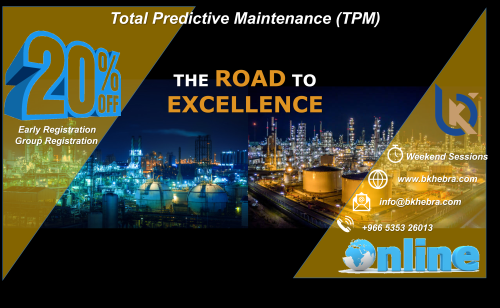| Training Code | Date | Duration | Venue | Fees |
|---|---|---|---|---|
| Keep following, we are updating our training schedules. | ||||

Lean organizations strive to reduce waste in all phases of the operation. Some of the least understood and most overlooked sources of waste relates to the condition and maintenance of processing equipment. One premise of Lean Manufacturing is that equipment is ready to run whenever it is needed (to meet customer demands). If the equipment is unexpectedly shut down in order to be repaired, critical deliveries may be missed. Poor equipment maintenance rekindles the “old” thinking that extra product inventory is needed as an insurance policy just in case process equipment is not operational thereby undermining Lean efforts, adding more waste.
A TPM effort focuses the organization on keeping equipment functioning optimally by reducing the frequency of breakdowns, the need for long, costly rebuilds and by circumventing many equipment malfunctions and intermittent equipment problems. To this end, much of the day-to-day responsibility for routine maintenance is transferred to the person closest to the equipment, the equipment operator.
Total Productive Maintenance (TPM) focuses on getting managers, maintenance personnel and equipment users all working together to prevent equipment problems and reduce expenditures. By giving ownership and responsibility of equipment and processes to the right employees, equipment breakdowns are reduced. 5S provides a systematic approach to setting standards and visual guides for preventing breakdowns and making your equipment run smoothly.
This 3-day B. Khebra’s Total Productive Maintenance (TPM) training course provides you with fundamental principles, evaluation and applications of Total Productive Maintenance, It will help you understand TPM “5S” foundation and the eight pillars supporting it, It will equip you with the ability to successfully plan a TPM program by establishing the 5S foundation and developing an autonomous maintenance plan. This frees up the maintenance staff to begin larger projects and perform more planned maintenance.
Upon successful completion of this course, the delegates will be able to:
On successful completion of this training course, BK’s Certificate with eligible Continuing Professional Education credits (CPE), will be awarded to the delegates , one CPE credit is granted per 50 minutes of attendance.